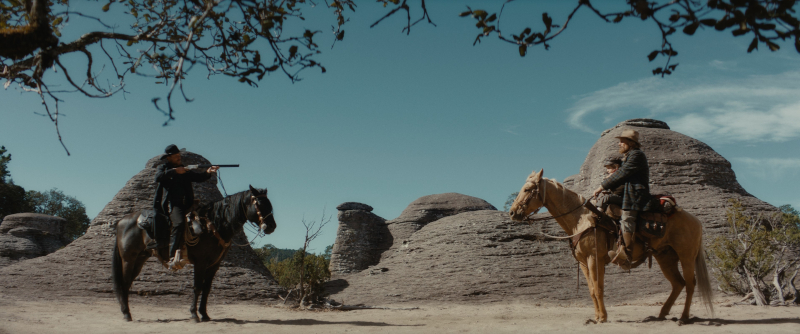Director – Viggo Mortensen – 2023 – US – Cert. 15 – 129m
***1/2
An independently-minded woman whose partner is away fighting a war struggles to survive in the Old West – out in UK and Ireland cinemas on Friday, June 7th
While there is much to admire in this Western, it suffers from unclear flashbacks and parallel editing. Both the trailer (below) and the UK press handouts circumvent this problem by describing a straightforward, chronological narrative (and a fascinating narrative at that). For anyone who doesn’t try to follow plot, this may not be a problem. For those who do, it most definitely is.
Two things happen at the start. One is a shoot out in which Weston Jeffries (Solly McLeod), a nasty bit of work with scant disregard for either decency or law and order, rides away into the evening after shooting various people inside and outside the town’s saloon, including the deputy sheriff. The town is apparently called Elk Flats, Nevada – something I gleaned not from the film (where, if that information is there, it’s easy to miss, and I missed it) but from the production notes.
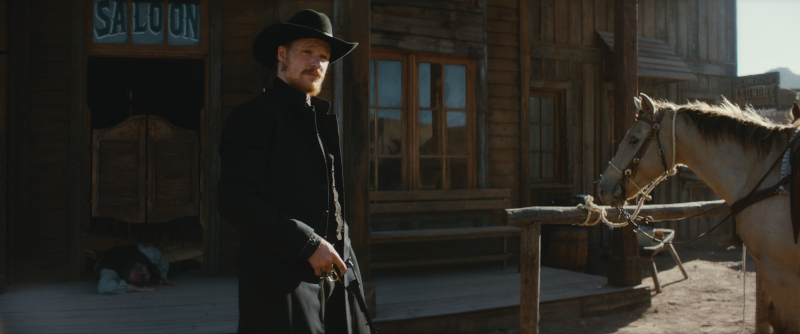
This is indicative of a problem with the film overall: there are certain key bits of information it needs to tell the audience, which it fails to deliver in a clear, comprehensible way. The name of the town doesn’t really matter. However, other omitted bits of information are of paramount importance. Hopefully, reading through this review, you will be alerted to these problems before viewing, and will, as a result, be able to follow the film much more readily than this writer did and, therefore, enjoy it a lot more.
The other thing that happens at the start is the death of the beloved, bedridden partner of a man who sits by her bedside (writer-director Viggo Mortensen, also the arguable lead), who we will later learn is a Danish immigrant called Olsen, and later still Holger Olsen. He digs her grave and buries her in the garden, helped by their young son. The local landowner Alfred Jeffries (Garret Dillahunt) and other dignitaries call by on horseback to offer their condolences to the town’s sheriff (for it is he).
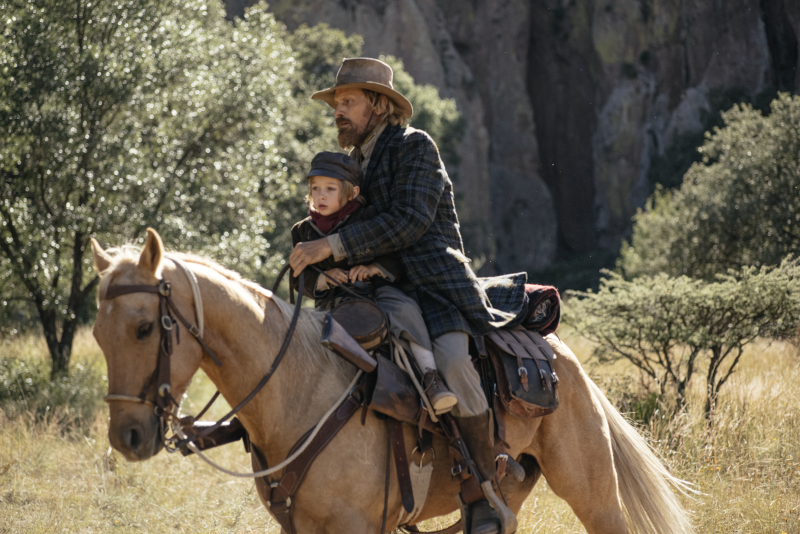
Olsen hangs out in San Francisco (again, it’s not evident that this is San Francisco, merely that it’s a seaport with a fish market) where he meets and strikes up a relationship with French-Canadian free-thinker Vivienne (Vicky Krieps) who is currently being courted by a rich man (Colin Morgan) for whom she doesn’t particularly care. She invites Olsen to the rich man’s private view of his art collection, where she introduces Olsen to the rich man as her friend.
Now, it’s not immediately clear that this is a flashback as to how Olsen met his partner, and the obvious assumption on the part of the audience is that this takes place after the death of his partner at the start and that this is a different woman. But, no, it’s a flashback (even though it doesn’t read as one) and it’s the same woman, only earlier. They journey cross-country to his home, and she sleeps with him, and all the time you’re wondering, where’s the kid? Where and why is Olsen hiding him? (Answer: the kid isn’t born yet: she’s his mother-to-be.)
Meanwhile, in Elk Flats, simpleton Ed Wilkins (Alex Breaux), a trusting member of Alfred Jeffries’ entourage, is tried for the saloon shooting, only realising he is being framed when the sentence of hanging is pronounced, his protestations of innocence falling on deaf ears. We witness his subsequent hanging. He will later be seen sitting at the saloon table with Jeffries Sr. and Jr. in scenes which, once again, are flashbacks, although, once again, the fact isn’t immediately clear.
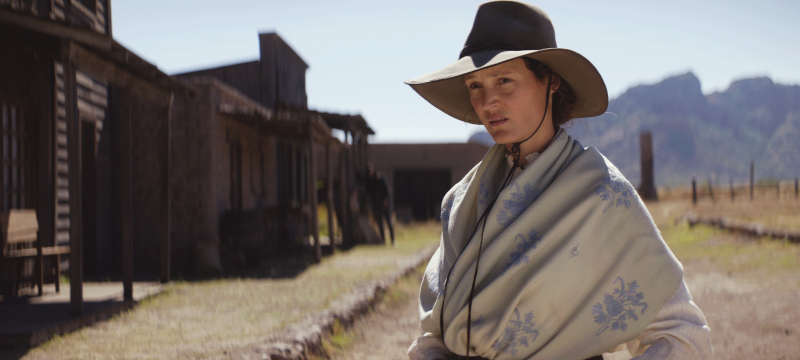
Olsen sets about planting flowers and trees on his property at Vivienne’s request; she, in turn, takes a bar job at the saloon (where the shooting hasn’t yet happened) to ensure she is a woman of independent means, which position only comes to pass because the lecherous Weston, who happens to be present and whose father owns the town, insists the reluctant bartender hire her. Olsen upsets her by signing up to fight in Mexico: one night during Olsen’s absence (of some years), Weston turns up, forces his way into the house and (in a commendably brief scene that refuses to dwell on the salacious detail that such sequences so often foreground) rapes Vivienne…
There is further flashback material (and this, at least, is unmistakeably a flashback) of Vivienne’s father going away to sort out a local dispute – we see him in a boat leaving wife and child – and never coming back. We also see her mother reading her the story of that early independently-minded French girl, Joan of Arc.
As Westerns go, after the first ten minutes, this is low on such genre staples as shootings and hangings, preferring instead to concentrate on a romantic / sexual relationship and (as Olsen drops out of the plot for a large chunk of the narrative) the life and perils of a fiercely independent woman trying to support herself.
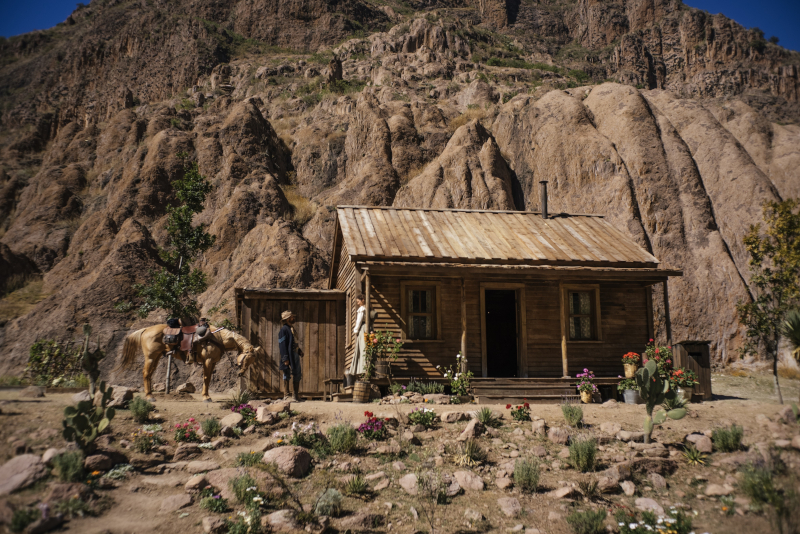
Visually it looks great, with much of the tale taking place at the modest, family homestead, a little of it in the nearest town and a sliver in the big city. It’s heavily character-driven, with strong performances in the small supporting cast, including Danny Huston as the corrupt mayor. McLeod is particularly good as the bad guy, while, in a comparatively small part, Breaux impresses as the fall guy.
The subtle score is by Mortensen as well, using a five-piece band which includes Scarlet Rivera, famously the showstopping violin player on Bob Dylan’s 1976 album Desire.
The flashback narrative may be confusing at times, but other elements – including striking performances by Mortensen and, particularly, Krieps – more than compensate.
The Dead Don’t Hurt is out in cinemas in the UK and Ireland on Friday, June 7th.
Trailer:
